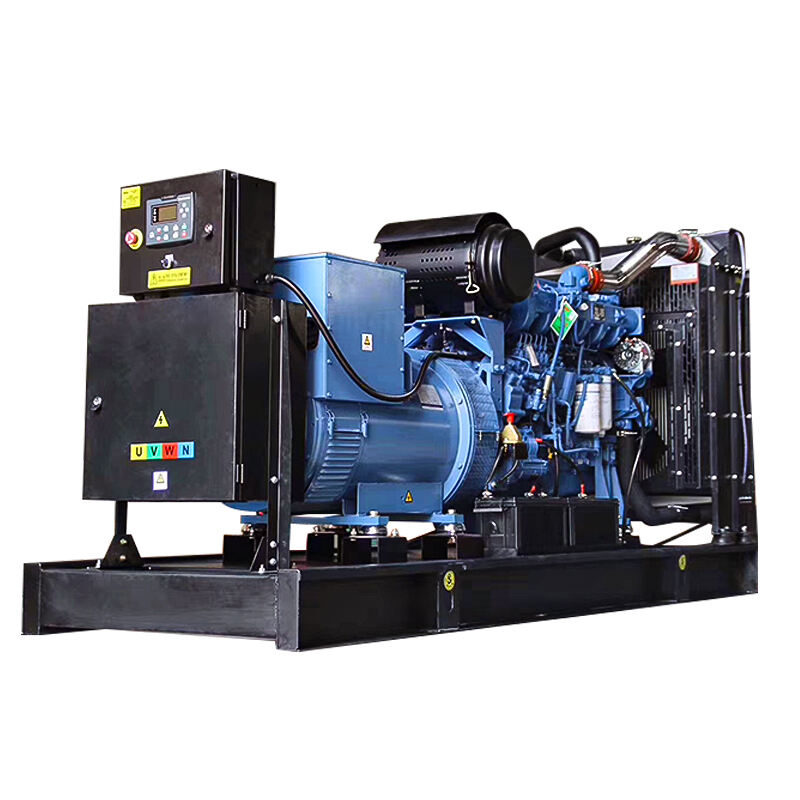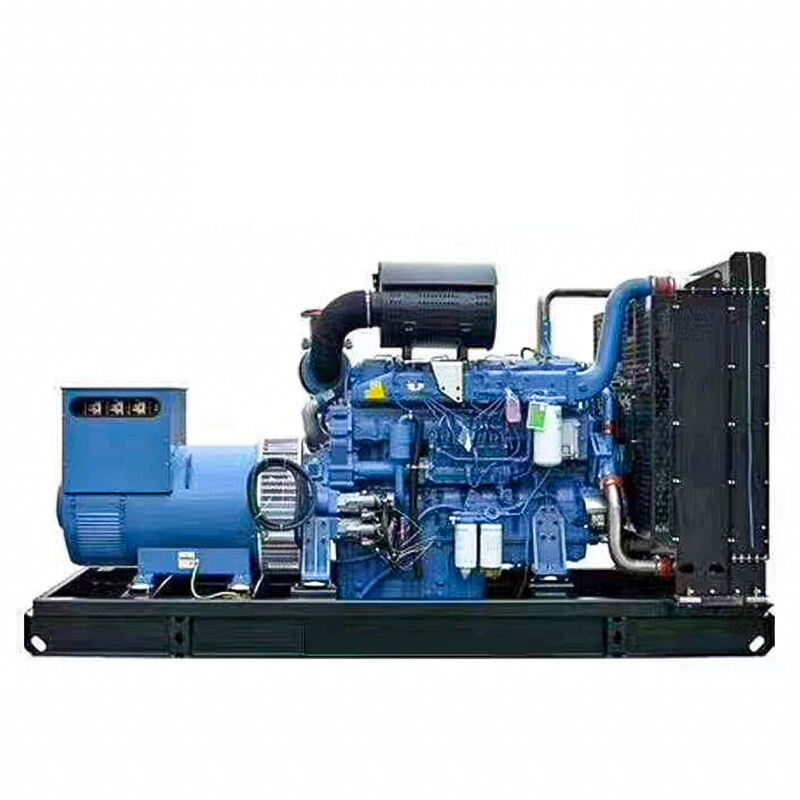Battery and Electrical System Failures in Diesel Generator Sets
Testing Battery Health and Voltage
Ongoing monitoring of battery conditions on diesel gensets is empowered with reliable testing at regular intervals. A considerable voltage reduction normally implies a damaged battery status. Nowadays, we can measure battery voltage right from the terminals by using equipment such as multimeters that help to diagnose potential problems like cranking slowly caused when the battery fails. The Battery Council International reports that at any given time, as much as 25% of batteries are non-compliant, so it’s good to have a policy where they are always tested proactively on our backup power systems.
Replacing Worn or Faulty Batteries
A diesel generator battery’s lifespan The lifespan of a diesel generator battery is important to understand in order to properly maintain its function; this article will outline this. As a general rule, batteries are removed from service based upon the length of time they have been in operational use as well as the environment to which they are subjected. As a rule : At 5 years or earlier in the case of older batteries that are already eking out an erratic service, they just have to be replaced. You should be cautious about safety when replacing batteries, follow the safety rules, including using protective clothing, and dispose of old batteries according to the regulations in your local area. The prompt replacement of batteries, especially if they are over 5 years old, can greatly diminish the generator failure risk and ensure it functions properly.
Maintaining Clean Electrical Connections
Clean electrical connections are necessary for proper functioning of diesel generators, and to protect them against arcing or corrosion. By simply performing routine maintenance, including: cleaning all connections and applying dielectric grease the performance of the unit increases dramatically. The National Electrical Manufacturers Association (NEMA) highlights that adequate maintenance can reduce electrical failures by as much as 50%. With proper practices such as efficient visual checks and prompt action, we can improve the reliability and life span of our diesel generator sets immensely.
Fuel System Blockages and Maintenance Challenges
Clogged Fuel Filters: Symptoms and Replacement Intervals
Blocked fuel filters on diesel powered generators can really reduce engine performance resulting in starting problems and poorer fuel efficiency. Symptoms are frequently a sluggish engine performance, slow start, and untypical noise from the engine. The these signs should be identify as soon as possible to avoid more damage to the system. Replacement time will vary depending on the size of your generator and how often you use it. Typically, smaller sized generators that are not used on a regular basis, or for prolonged periods of time, may need their filters replaced once per year but larger models that are used regularly could require them to be changed several times, according to manufacturer recommendations. It is interesting to note that 30% of all fuel related problems to the filter condition, and that is why routine and scheduled filter changes are very important.
Addressing Black Smoke Through Injector Inspections
Appearance of "black smoke" in DG sets may indicate incomplete combustion which is usually lead by poor (clogged) injector performance. Black smoke, of course is an indication that the units are not burning cleanly. If fuel injectors are to be inspected we would be looking for signs of use (e.g. visual inspection and flow tests). The time for inspection shall meet the requirements for regular inspections, and professional help shall be used when abnormal conditions are found. This enabled a team of scientists to demonstrate that by improving injector performance, emissions can be cut by as much as 25%, which is proof enough for good reason to keep to a regular maintenance schedule to keep those emissions in check.
Preventing Contaminated Fuel Damage
The contamination of fuel is an enemy of good engine performance and the danger it poses will amplify with time. These contaminants are water, sediment and particulates, which are capable of blocking the fuel system and reducing the fuel efficiency of the diesel generator. Measures to reduce risks are important to be preventive. Fuel stabilizers help keep fuel pure, while frequent checks of fuel storage conditions help keep contaminants away. When We say “clean”, We are not only referring to the quality of the fuel but also that the associated filtration systems are in good working order- studies have shown that, systems with bad filtration encounter up to 60% more downtime on account of fuel related issues. This makes maintenance and proactive practices crucial to protect against contaminated fuel harm.
Overheating Causes and Cooling System Solutions
Identifying Coolant Leaks and Reservoir Checks
Coolant escape is also a leading cause of diesel generator overheating and affects its performance. Puddles under the generator or jumps in your engine temperature were the typical signs of coolant leaks. All other regular checks of the coolant reservoir are also important, filling to the right level of coolant prevents the system from overheating. The industry reports that up to 20% of heating failures are caused by leaks, which underlines the importance of regular checks.
Optimizing Radiator Airflow and Cleaning
Radiator are essential component in the cooling system to keep the motor running cool, the airflow Demanded by your vehicle's engine depends primarily on your vehicle, take functionality of your radiator seriously with the performance radiator. Factors contributing to reduced air flow include blockage due to debris and dirt build up. Cleaning radiator instructions should be adhered to religiously. Where this is applicable these uses any safe cleaning materials and the standard cleaning time intervals may be applied where appropriate e.g. Monthly checks or after heavy duty. Statistics show that clogged radiators effect as much as a 40% increase in temperature so regular maintenance should be a priority. This activity actively enhances the cooling efficiency of Diesel Gensets.
Thermostat Calibration for Temperature Regulation
The thermostat, is critical for controlling engine temperature and can cause overheating. The calibration or replacement of thermostats is something you cannot overlook and also need to know when it becomes a point of professional concern. To do so, one can test the thermostat's reaction and change it if needed. Statistics show that incorrectly set thermostats can leave your engine up to 50% more likely to fail, reinforcing the importance of regular checks and recalibration. It is important to keep up with these valuable practices to protect your diesel generators from temperature regulation problems and expensive damage.
Combustion Irregularities and Exhaust Issues
Diagnosing Incomplete Combustion via Smoke Analysis
∗ Incomplete burning in diesel engines have a great effect on their efficiency and emissions. This frequently appears in the actual color of the smoke — a very important clue. You would look at the color and density of the smoke to figure out exactly what fuel mixture or ignition timing problem you have. For instance, black smoke is usually a sign of a rich fuel mixture, while blue smoke may be a sign of oil being burned. Solving these problems enhances engine performance while minimizing pollutants. It is well accepted that if we see any smoke from exhaust, that would be fuel undergoing incomplete combustion and a 30% or so loss of fuel economy that we have no reason to accept, so let us get that smoke out of here by checking the exhaust for smoke.
EGR Valve Maintenance to Prevent Carbon Buildup
The EGR valve is a critical component for lowering NOx emissions by recycling exhaust gases by recirculating a part of an exhaust stream to the engine's cylinders which lowers the combustion temperature. If you ignore service for an EGR valve, the risk of clogging byproduct buildup increases as time goes on, affecting your engine's operation and emissions levels. Routine maintenance is simply the inspection of clogged valves, the inspection of their operations and the cleaning. Some common symptoms of a bad EGR valve include rough idling, a decrease in potential fuel efficiency, and a slight increase in emissions. Calculations indicate that 15% of diesel generator exhaust problems are due to EGR trouble, therefore the need to service this component to ensure the efficiency of the exhaust and the engine overall.

Exhaust System Blockage Detection
Clogged exhaust Clogged exhaust systems will greatly reduce the performance of a diesel engine and can manifest as excessive exhaust noise and fluctuating RPM. These blockages are determined by back pressure tests and visual inspection, which are important to keep system efficiency in place. Obstructions can force the engine to exert itself, which can result in overheating and even damage. According to real figures it is estimated that about 25% of diesel engine performances drawbacks come from the obstruction of the exhaust. This just highlights the importance of checking regularly and maintaining your engine, so that way you never encounter many blue screens of death, which are expensive repairs. By staying vigilant, it’s easier to identify possible blockages and deal with them before they impact engine health and efficiency.
Implementing Routine Performance Diagnostics
Routine performance diagnostics are essential to help find the early signs of generator problems in order to avoid costly maintenance. Because the status of the generator is checked automatically, issues can be diagnosed before they become big problems. Routine checks can be carried out by using a variety of diagnostic tools and equipment, and state-of-the-art software for data logging will impart an instant overview of generator performance. Industry stats indicate that preventive maintenance can decrease repair costs by as much as 40%, underlining the need to implement systematic diagnostics into your maintenance philosophy.
Scheduled Fuel Filter and Oil Changes
Following the correct timing on diesel generator maintenance can be crucial, because the life of a diesel generator depends on regular maintenance of the fuel and oil. These Schedules are vital in maintaining your generators peak performance, preventing possible damage to the engine as a result of contaminants. Frequent replacements are highly associated with a longer lifespan with 30% fewer failures in generators scheduled for maintenance than those without scheduled maintenance. It’s important to adhere to manufacturers’ guidelines while balancing with operational requirements to determine the best schedules for these changes.
Load Bank Testing for System Validation
Load bank testing is important to ensure that a diesel generator will meet load requirements under different load factors. This procedure connects the generator to a load bank that mimics various operating conditions to determine if the generator is robust and reliable. Doing periodic load bank testing as a part of preventative maintenance can greatly improve the performance of the generator. Data indicates testing has the potential to increase reliability and capacity by 20%, so it is a must-do practice. Routine validation via load bank testing instills confidence in the generator’s state of readiness, and brings attention to any problem areas.
FAQ Section
Why is testing battery voltage important for diesel generators?
Testing battery voltage in diesel generators is crucial because a significant drop in voltage can indicate battery failure, which can disrupt generator operation and reliability.
How often should clogged fuel filters be replaced?
Clogged fuel filters should be replaced based on generator size and usage patterns. Smaller generators might require annual changes, whereas larger, frequently used units may need more frequent replacements.
What are the signs of coolant leaks in generators?
Signs of coolant leaks include visible puddles under the generator and abnormal spikes in engine temperature. Regular reservoir checks are essential to prevent overheating.
How can load bank testing improve generator performance?
Load bank testing involves simulating operational scenarios to validate a generator’s capability to handle expected loads, thereby enhancing performance and reliability.
Table of Contents
- Battery and Electrical System Failures in Diesel Generator Sets
- Fuel System Blockages and Maintenance Challenges
- Overheating Causes and Cooling System Solutions
- Combustion Irregularities and Exhaust Issues
- Implementing Routine Performance Diagnostics
- Scheduled Fuel Filter and Oil Changes
- Load Bank Testing for System Validation
- FAQ Section

